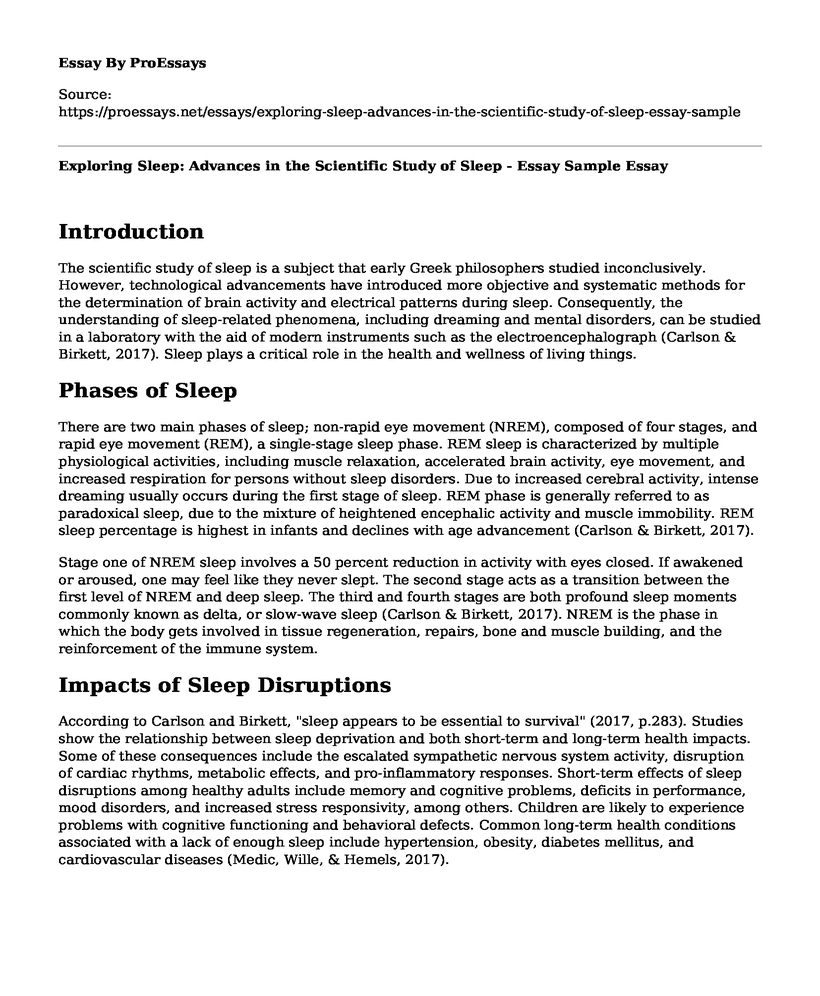Introduction
The scientific study of sleep is a subject that early Greek philosophers studied inconclusively. However, technological advancements have introduced more objective and systematic methods for the determination of brain activity and electrical patterns during sleep. Consequently, the understanding of sleep-related phenomena, including dreaming and mental disorders, can be studied in a laboratory with the aid of modern instruments such as the electroencephalograph (Carlson & Birkett, 2017). Sleep plays a critical role in the health and wellness of living things.
Phases of Sleep
There are two main phases of sleep; non-rapid eye movement (NREM), composed of four stages, and rapid eye movement (REM), a single-stage sleep phase. REM sleep is characterized by multiple physiological activities, including muscle relaxation, accelerated brain activity, eye movement, and increased respiration for persons without sleep disorders. Due to increased cerebral activity, intense dreaming usually occurs during the first stage of sleep. REM phase is generally referred to as paradoxical sleep, due to the mixture of heightened encephalic activity and muscle immobility. REM sleep percentage is highest in infants and declines with age advancement (Carlson & Birkett, 2017).
Stage one of NREM sleep involves a 50 percent reduction in activity with eyes closed. If awakened or aroused, one may feel like they never slept. The second stage acts as a transition between the first level of NREM and deep sleep. The third and fourth stages are both profound sleep moments commonly known as delta, or slow-wave sleep (Carlson & Birkett, 2017). NREM is the phase in which the body gets involved in tissue regeneration, repairs, bone and muscle building, and the reinforcement of the immune system.
Impacts of Sleep Disruptions
According to Carlson and Birkett, "sleep appears to be essential to survival" (2017, p.283). Studies show the relationship between sleep deprivation and both short-term and long-term health impacts. Some of these consequences include the escalated sympathetic nervous system activity, disruption of cardiac rhythms, metabolic effects, and pro-inflammatory responses. Short-term effects of sleep disruptions among healthy adults include memory and cognitive problems, deficits in performance, mood disorders, and increased stress responsivity, among others. Children are likely to experience problems with cognitive functioning and behavioral defects. Common long-term health conditions associated with a lack of enough sleep include hypertension, obesity, diabetes mellitus, and cardiovascular diseases (Medic, Wille, & Hemels, 2017).Reflection and Conclusion
NREM and REM phases of sleep are essential in the restoration and revitalization of the physiological functions of the brain and the entire body. Studies conducted on mice suggest that the brain uses sleep to facilitate the removal of potential neural toxic wastes that accumulate when the central nervous system is alert. Consequently, sleeping is inevitable as the brain is accustomed to switching between normal and restorative functions. Thus, lack of sleep and rest may contribute to different mental disorders, including Alzheimer's illness. A significant percentage of the entire world's population suffers from chronic sleep disturbances. Most work schedules extend to irregular hours, thereby minimizing the required hours of rest. Sleep deprivation is associated with a wide range of psychiatric health conditions and compromise on the immune system. An extensive study on the sections of the central nervous system that control sleeping and waking up and the functioning mechanism can be vital in the discovery of therapies for people with sleep disruption problems.
References
Carlson, N. & Birkett, M. (2017). Physiology of behavior. Pearson Education Limited.
Medic, G., Wille, M., & Hemels, M. (2017). Short- and long-term health consequences of sleep disruption. Nature and Science of Sleep, 2017(9), 151-161. Doi: 10.2147/NSS.S134864Bottom of Form
Cite this page
Exploring Sleep: Advances in the Scientific Study of Sleep - Essay Sample. (2023, Apr 27). Retrieved from https://proessays.net/essays/exploring-sleep-advances-in-the-scientific-study-of-sleep-essay-sample
If you are the original author of this essay and no longer wish to have it published on the ProEssays website, please click below to request its removal:
- Legalized Medical Use of Marijuana to Treat Cancer or MS Essay Example
- Essay Example on Nurse's Biases and Attitudes Towards Incarcerated Individuals
- Essay Sample on Child Anemia: Causes, Symptoms & Treatment
- Paper Example on Distracted Driving: Teens Increasingly Involved in Accidents and Fatalities
- Chronic Kidney Disease: Impact on US Patients & Society - Essay Sample
- Paper Example on Average Utilization, Satisfaction, Readmissions: Variations & Estimations
- Abortion - Free Essay Example







